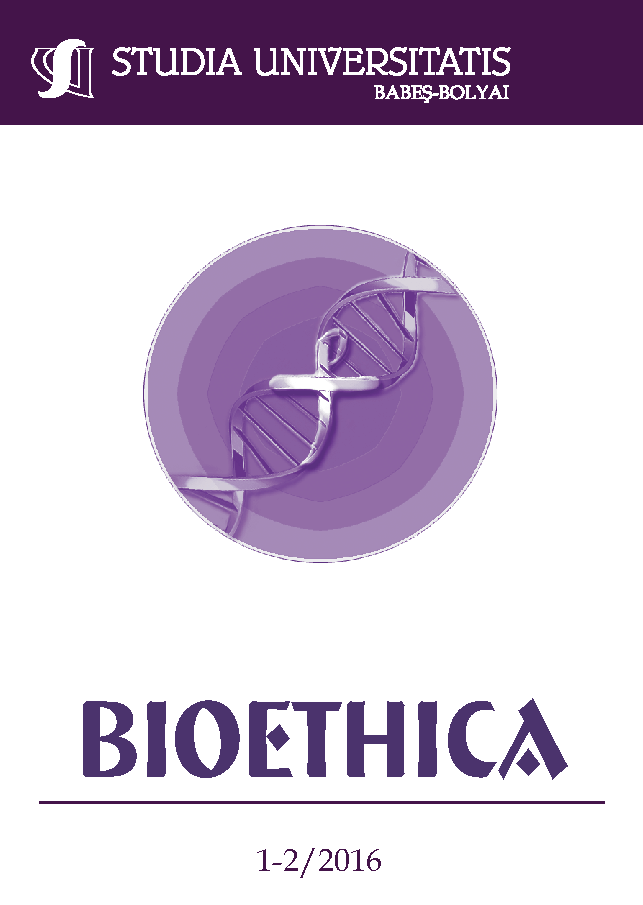ETHICAL ASPECTS OF CLASHING TITANS: TRAUMATIC BRAIN INJURY VERSUS AUTONOMY
Keywords:
autonomy, traumatic brain injury, neurocognitive behavior, legal rightsAbstract
Traumatic brain injury has become a leading cause of mortality and morbidity in both civilians and military, considered the modern version of a silent epidemic, since its real incidence is on the rise. In the field of medical ethics, autonomy represents endogenous determination that does not withstand controlling interferences not personal limitations. Traumatic brain injury (TBI) might affect cognitive capacities critical to the adequate exercise of autonomy. The hallmark of this disorder is the possibility of producing survivors who preserve normal, almost-normal or border-line intellectual capacities, certified as being competent and not in the need of a guardian or substitute decision maker, even though an impaired capacity to evaluate their own behaviors and limitations accurately is widely encountered. Aiming to reflect the proposed pattern, a questionnaire echoing self-awareness was apprised by patient and associated family member. The study revealed population at risk for TBI resembling childhood age, elderly, low-come individuals, unmarried people and patients with previous history of TBI or psychiatric pathology, with equal sex ratio distribution. Moreover, a difference of opinions has been noticed when evaluating the arisen topics from the questionnaire. In such cases, conserving the right of autonomy is not such as forthright as one might consider, thus requiring different ethical commitments and tactics. A slight look inside the neurologic pathology of TBI and its neurocognitive consequences seems to yield the basics of understanding situations that decline autonomy with preserved legal rights.
Aspecte etice privind autonomia pacienților cu leziuni traumatice cerebrale. Leziunile traumatice cerebrale (LTC) au devenit o cauza importanta de mortalitate si morbiditate atat in cadrul populatiei civile cat si celei militare, fiind considerate o adevarata epidemie silentioasa, mai ales ca incidenta lor reala este in continua crestere. LTC pot afecta capacitatile cognitive esentiale in exercitarea autonomiei individului. O caracteristica a acestei entitati patologice este aceea ca pacientii pot prezenta capacitati intelectuale normale, aproape-normale sau de limita, fiind insa in acelasi timp certificati ca si competenti psihic si neavand nevoie de un tutore legal, chiar daca s-a obervat ca o capacitate scazuta de a-si evalua propriile comportamente si limite este des intalnita. Pentru a demonstra caracteristica anterioara, am elaborat un chestionar care sa reflecte constinta de sine, pe care l-am inaintat atat pacientilor cat si apartinatorilor lor. Acest studiu a fost adresat unei populatii recunoscute ca fiind cu risc crescut de a dezvolta LTC si anume copii, batrani, indivizi cu status economic scazut, persoane necasatorite precum si pacienti cu un istoric anterior de LTC sau boli pshice, distributia pe sexe fiind egala. Rezultatele au aratat o diferenta de opinii intre perceptia pacientilor si a apartinatorilor. In astfel de cazuri, conservarea dreptului autonomiei nu este atat de clara cum s-ar crede in mod obisnuit, in consecinta fiind nevoie de aplicarea unor comportamente si tactici etice particulare. O privire atenta asupra patologiei LTC si a consecintelor sale neurocognitive poate conferi o mai buna intelegere a situatiilor care declina autonomia individuala cu pastrarea drepturilor legale si respectiv a conflictelor etice care decurg din aceasta.
Cuvinte-cheie: autonomie, leziuni traumatice cerebrale, comportament neurocognitiv, drepturi legale.
References
Faul M, Xu L, Wald MM, Coronado VG. Traumatic brain injury in the United States: emergency department visits, hospitalizations, and deaths 2002-2006. Atlanta (GA): Centers for Disease Control and Prevention, National Center for Injury Prevention and Control; 2010.
Lux WE. The neurocognitive basis of compromised autonomy after traumatic brain injury: Clinical and Ethical Considerations. Neurotherapeutics. 2007 Jul;4(3):525-30.
Frankfurt HG. Autonomy, necessity, and love. In: Necessity, volition, and love. Cambridge: Cambridge University Press; 1999: 129–141.
The world medical association, inc. World Medical Association declaration of Lisbon on the rights of the patient, October 2005, page 2-3.
Love S, Louis ND, Ellison WD. Greenfield’s Neuropathology, 8th edition. Hodder Arnold, London, UK, 2008.
McKee AC, Stern RA, Nowinski CJ, Stein TD, Alvarez VE, Daneshvar DH, Lee HS, Wojtowicz SM, Hall G, Baugh CM, Riley DO, Kubilus CA, Cormier KA, Jacobs MA, Martin BR, Abraham CR, Ikezu T, Reichard RR, Wolozin BL, Budson AE, Goldstein LE, Kowall NW, Cantu RC. The spectrum of disease in chronic traumatic encephalopathy. Brain. 2013 Jan; 136(Pt 1):43-64.
Arnould A, Dromer E, Rochat L, Van der Linden M, Azouvi P. Neurobehavioral and self-awareness changes after traumatic brain injury: Towards new multidimensional approaches. Ann Phys Rehabil Med. 2016 Feb;59(1):18-22.
Granacher RP. Traumatic Brain Injury: Methods for Clinical and Forensic Neuropsychiatric Assessment. Second Edition. Ed. CRC Press. 2008.
Walker KR, Tesco G. Molecular mechanisms of cognitive dysfunction following traumatic brain injury. Front Aging Neurosci. 2013 Jul 9;5:29.
Zollman FS. Manual of Traumatic Brain Injury Management. First edition. Demos Medical Publishing. 2011.
Silver JM, McAllister TW, Yudofsky SC. Textbook of Traumatic Brain Injury, Second Edition, American Psychiatric Publishing, Washington DC. 2011.
Cowe SF. The Behavioural and Emotional Complications of Traumatic Brain Injury. First edition. Taylor & Francis Group. 2008.
Handelman M, Parke B. The Beneficial Role of a Judicial Process When "Everything" Is Too Much?. Healthc Q. 2008;11(4):46-50.
Pape TL, Jaffe NO, Savage T, Collins E, Warden D. Unresolved legal and ethical issues in research of adults with severe traumatic brain injury: Analysis of an ongoing protocol. J Rehabil Res Dev. 2004 Mar;41(2):155-74.
Cancelliere A. Cognitive, Emotional And Behavioural Changes Following Traumatic Brain Injury: Mechanisms And Management. The Ontario Brain Injury Association.2011
Zolman FS. Manual of Traumatic Brain Injury Management. Demos Medical Publishing. New York. 2011.
Stern RA, Riley DO, Daneshvar DH, Cantu RC, McKee AC. Long-term Consequences of Repetitive Brain Trauma: Chronic Traumatic Encephalopathy. PM R 2011; 3: S460-S467.
Green DS, MacKenzie CR. Nuances of Informed Consent: The Paradigm of Regional Anesthesia. HSSJ (2007) 3: 115–118. World Medical Association. Medical Ethics Manual. 3rd edition, 2015.
Howe LLS. Distinguishing genuine from malingered posttraumatic stress disorder in head injury litigation. Detection of Malingering during Head Injury Litigation. 2012, 301-331, DOI: 10.1007/978-1-4614-0442-2_11.
Downloads
Published
How to Cite
Issue
Section
License
Copyright (c) 2016 Studia Universitatis Babeș-Bolyai Bioethica

This work is licensed under a Creative Commons Attribution-NonCommercial-NoDerivatives 4.0 International License.






